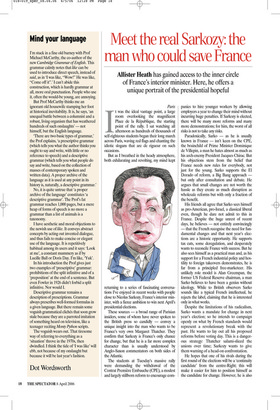Mind your language
I’m stuck in a fine old barney with Prof Michael McCarthy, the co-author of the new Cambridge Grammar of English. This grammar calmly notes that like can be used to introduce direct speech, instead of said, as in ‘I was like, “Wow!” He was like, “Come off it”.’ I can’t abide this construction, which is hardly grammar at all, more oral punctuation. People who use it, often the would-be young, are annoying.
But Prof McCarthy thinks me an ignorant old housewife stamping her foot at historical inevitability. It is, he says, ‘an unequal battle between a columnist and a robust, living organism that has weathered hundreds of such onslaughts’ — not himself, but the English language.
‘There are two basic types of grammar,’ the Prof explains, ‘a prescriptive grammar (which tells you what the author thinks you ought to say and write, with little or no reference to speech) and a descriptive grammar (which tells you what people do say and write, based on the collection of masses of contemporary spoken and written data). A proper archive of the language as it is used at any point in its history is, naturally, a descriptive grammar.’ No, it is quite untrue that ‘a proper archive of the language’ constitutes ‘a descriptive grammar’. The Prof’s fat grammar reaches 1,000 pages, but a mere heap of forms of speech is no more a grammar than a list of animals is a taxonomy.
I have aesthetic and moral objections to the newish use of like. It conveys abstract concepts by acting out invented dialogue, and thus fails to make concise or elegant use of the language. It is repetitively habitual among its users and it says: ‘Look at me’, a constant mummery as if by Lucille Ball or Doris Day. I’m like, ‘Yuk’.
In his introduction the Prof gives just two examples of ‘prescriptive’ grammar: prohibitions of the split infinitive and of a ‘preposition’ at the end of a sentence. But even Fowler in 1926 didn’t forbid a split infinitive. Nor would I.
Descriptive grammar remains a description of prescriptions. Grammar always prescribes well-formed formulas in a given language. But there remain some voguish grammatical clichés that soon grow stale because they are a parroted imitation of something heard on television, like a teenager reciting Monty Python scripts.
The voguish wears out. That tiresome way of referring to everything as a ‘situation’ throve in the 1970s, then dwindled. I think the tide of ‘I was like’ will ebb, not because of my onslaught but because it will be last year’s fashion.
Dot Wordsworth










































































 Previous page
Previous page